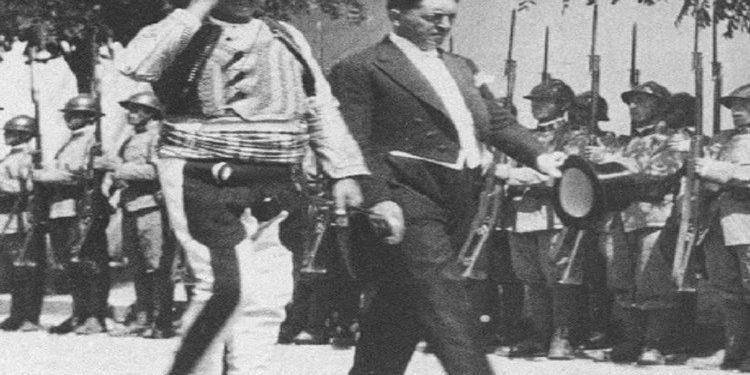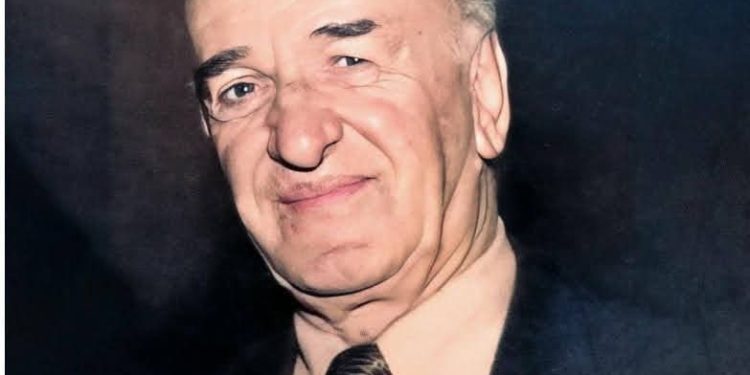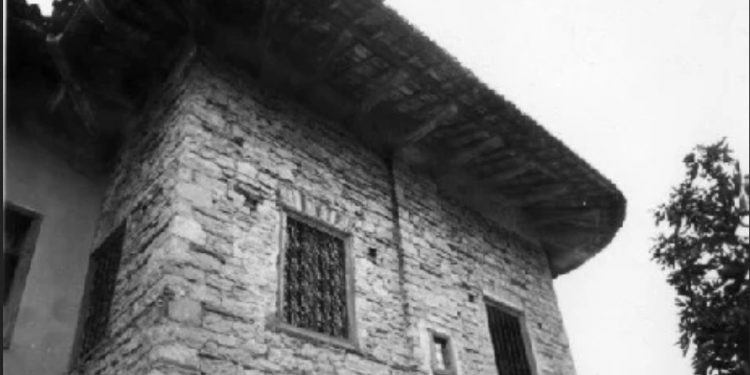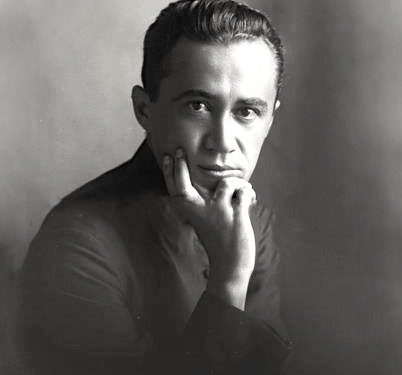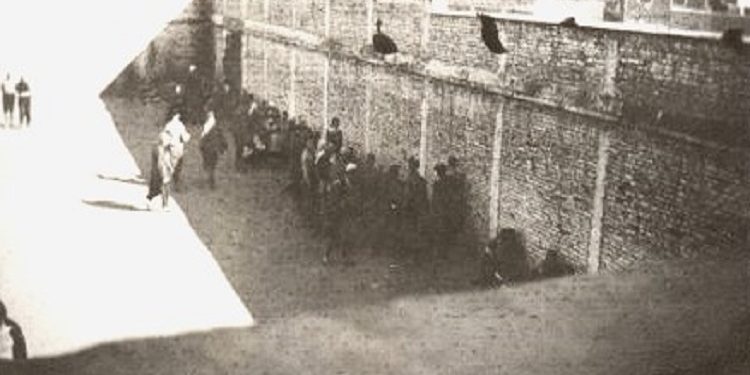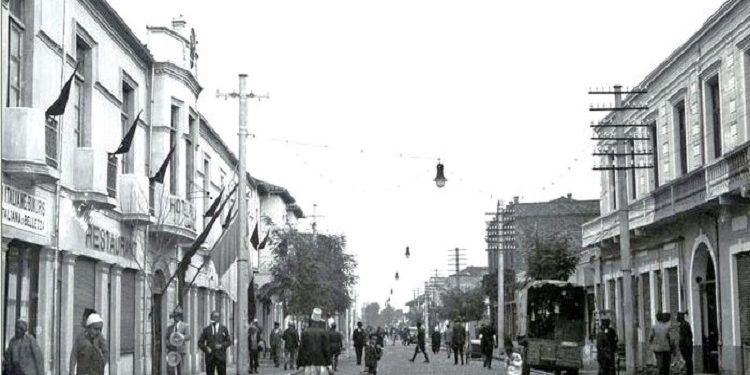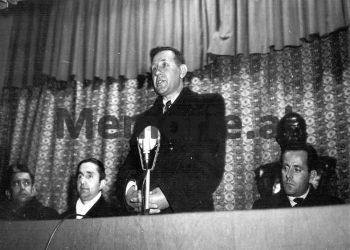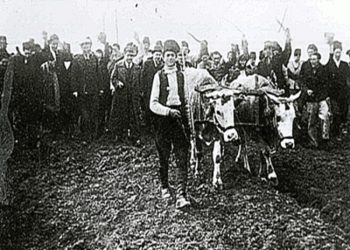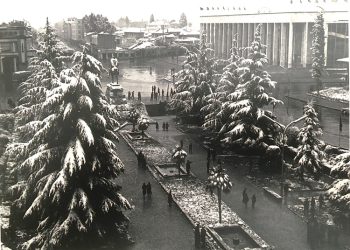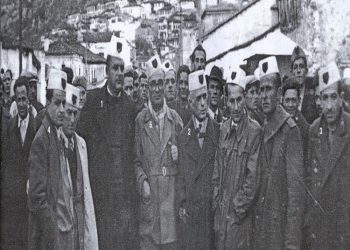By Ahmet Bushati
Part eleven
Memorie.al/After the flag was altered in 1944 with the addition of the communist star, Shkodra transformed into a center of resistance against the regime, paying a high price for its tradition of freedom. By April 1945, high school students, already feeling betrayed by the promises of the war, gathered to oppose the new terror that imprisoned and killed innocent people. Communism turned Kosovo into a province of Yugoslavia, while Shkodra was punished for its “historical crime”- its defiance against invaders. The “Postriba Movement” became a tool to suppress all dissent, plunging the city into an unprecedented spiral of suffering: imprisonments, executions, and the destruction of families. The high school students, alongside citizens, became symbols of resistance, while some “young communists” turned into tools of the State Security, leading to expulsions, imprisonments, and internments.
Four times, Shkodra rose in armed rebellion, but history forgot these battles. This book is written to remember the countless prisoners, the tortured, the killed, and the parents who suffered in silence. It is a warning against dictatorship and a plea for future generations not to forget the sacrifices made for freedom.
Continued from the previous issue
In the Footsteps of a Diary
Shkodra in the first years under communism
Two months of brutal communist terror had been enough for times to change for the worse, to the extent that even the ancient temples, from time to time, had begun to be abandoned, and Sylço Bey, for the decision he had made, was in danger of dying on the high road. So, out of suspicion that he had been investigated by spies and in order not to bring consequences to the house where he was staying, he decided one cold winter night to leave it and, to take the direction, no longer to some shelter of a relative or friend, where he would spend the last days of his now superfluous life, but to the desolate ruins of the former House of his younger brother, Sheuqet Bey, where no one had set foot and from where he would not cause consequences to anyone on earth.
So he set out to die of hunger and perhaps even more of the cold, within the ruins of his brother’s former house, destroyed two months earlier by the explosion of ammunition, there in the meadow with his name. This last act of Sylço Bey should have been the most dignified, the most humane and the most magnificent that he would choose, to end with honor a life already seriously threatened, to be humiliated by the bastard and criminal communists.
The distance of three to four hundred meters that separated him from the place where he had thought up his “herakiri” exceeded his physical capabilities several times. However, he, as if he were a mythical character, began to walk alone along the deserted road, and to break more and more the darkness of the night and the cold north that had frozen everything. So, as he crossed the main road of “Parruca” and entered that of “Baja e Vogël”, his last forces began to give way and after no more than a hundred meters that he had made, he would desperately look for the first door that would lead him out. To his bad luck, that door to which he was trusting his end, had contained the evil within, with which he had shot a house of communists, so that Sylço Bey, “would not exchange him for mutton”!
The lady of the house, mother of the proletarian communist, Ramiz Mustafa and of his two sisters, also communists, had gone out at that late hour of the night, to lock the door of the courtyard, behind which she, as if suspiciously, had spotted a shadow. Out of curiosity, she had stuck her head out and when she had noticed and recognized Sylço Bey, frozen from the cold, out of surprise, she had uttered the words “Are you here, Sylço Bey?” and had immediately flown to inform the People’s Defense Forces, who when they had arrived there, had found Sylço Bey with his finger on the revolver, but were unable to fire it, as he was frozen from the cold.
The revolver with its initials “A Zog”, in the hands of Sylço Bey, due to the weather conditions and his physical condition, had been the most superfluous and useless thing in his hands, frozen like wood. The partisans arrested him more easily than if they were arresting a child. It was not for nothing that his capture had been delayed even a little while, so that he would die of the cold and melt away like a breath that would never be caught again. But no, it was said that he too would not die, without first passing through the hands of the communists.
Whether or not they had friendships with Sylço Bey, or even acquaintances, various citizens of Shkodra, the fact that he fell into the hands of those partisans, who were increasingly dehumanizing and mercilessly killing every opponent of theirs, would make him a source of pain to everyone. After hearing the news of Sylcho Beg’s capture outside, I quickly returned home and when I entered the kitchen, I found my father sitting in his usual place, on a thick sheepskin blanket, which was warming itself near the stove, with a large fire of wood in front of him.
When I said to him: “Father, they had Sylço Bey”, he suddenly turned pale and lowered his head, shaking it and saying: “This place is ending”, “This place is ending”! While I, my mother and a sister who happened to be there, would watch with surprise and for the first time in our lives, as two or three large tears were slowly sliding down his cheeks.
At first, Sylço Bey and Dom Lazër Shantoja were kept for a few days in Shkodra, precisely in the house of Dr. Karamitri, where the People’s Defense Command had initially been established, and very soon they were sent back to Tirana. There, in the Tirana prison, they would once mistakenly mix them with other prisoners. On this occasion, Fejzi Alizoti, who had been a minister repeatedly in the past, would speak thus to his nephew, Myfi Bushati, when a One day he too would be found in a prison cell in Tirana:
“When I saw Sylço Bey being put in our hut, as a friend I had known for a long time, I went out to him and took him close to me. I then asked him if he had suffered during those days and he told me that a partisan had slapped him, which he felt he was suffering as a humiliation that had been done to him. Then I asked him if his master wanted anything, and he answered me firmly: A coffee”!
Sylço Bey together with Dom Lazri, shot on February 21, 1945!
A prisoner named Bushati, who had been living in Tirana for years, was sentenced to only a few months in prison for an ordinary crime, and whom the prison administration used to help the police, in connection with the movement of food and prisoners’ belongings, one day he would tell Myfit: “When Sylço Bey and Dom Lazri were told to get ready that they would take them to be shot, Sylço Bey asked them to allow him to take ablution and pray, which they allowed him.
Back, when Sylço Bey was being taken from the prayer room, before he got close enough, he called out to Dom Lazri – about whom he said that they had tortured him a lot – with the same smile: Get ready, Dom Lazri, because once we have left, once we have to die! You continued to that man spoke to Myfit about his uncle, he would add that; ‘Sylço Bey was so calm before death, as if he were going to change places and not be shot’!
And without a doubt, that it should have been so, both because of the education with which he was raised, and because of the deep religious faith he had, that his fate, like that of every person, was predetermined by God, and because he had understood by then that his time had come and that every day more life would be a burden that he could no longer bear.
On January 30, the brothers, Qazim, Sheuki and Shyqyri Bushati, were arrested, as well as their cousin and nephew of Sylço Bey, Myfit Myrto Bushati. As is known, Sylço Bey, together with Dom Lazër Shantoja, had left very quickly for Tirana, while the four Bushatli brothers above had been brought before a partisan court, presided over by Lieutenant Colonel Esat Ndreu. The trial had been quick and formal and the sentences given had not been made known to them, apparently with the intention that those decisions would be seen by any of their military superiors.
As he would later learn, Qazim Bushati, in order to save his brothers, had taken everything upon himself in the trial and, as a result, had been sentenced to death, while the other three Bushatli brothers, with thirty years each, decisions that would be published in the press, even though they had not been communicated to the convicts themselves.
It is worth mentioning that at the end of the day when the above trial was held, there were gathered in the Municipality, – according to the statement of Cuf Lohja, then head of the order for Shkodra – Mehmet Shehu, who at that time was leading the punitive operations in Shkodra, Zija Dibra, as the party secretary that he was, Cuf Lohja and Esat Ndreu, who had tried and sentenced those Bushatlij.
According to Cuf Lohja, Zija Dibra who had known Myfit Bushati for a long time and who during the War, when he had been illegal, had found shelter and welcomed him warmly in his house, but who nevertheless, in this case, had addressed Mehmet Shehu, saying: “I am of the opinion that Myfit Bushati’s sentence of thirty years should be converted into a death sentence, as the grandson of Sylço Bey who he is and as the ballistics officer that he was”.
Mehmet Shehu had fallen into thought for a few moments and everyone, like Cuf Lohe, did not know what he would say, if the latter had not intervened to speak to him: “Myfit Bushati is a young man of twenty-five years old, raised as an orphan by a single mother, and who has never done anyone any harm.” After these words of Cuf Lohe, Mehmet Shehu had not lasted any longer, and when he fell short, he had said: “Okay, okay, with death, one of them”!
Zija Dibra, one of the first communists of Shkodra and one of the main leaders of the War in the Shkodra region, would spend a life of prisons and exiles and would have been so much fought for, that even when he died one day in the village of Gur i Zi, where he had been exiled in recent years, the Shkodra Party Committee would not even allow him the right to a grave in his own city, to be buried there in Gur i Zi, accompanied by only seven or eight of his closest people, led by his loyal wife, Biseren from Sarajevo who, having never taken into account the constant pressures that were put on her by the Sigurimi, to break away from him, she would continue to share his fate without wavering. And they had no children either.
For the reader’s curiosity, we tell you that Esat Ndreu himself would one day be sentenced to life imprisonment by Enver Hoxha. Qazim Bushati would learn that he had been sentenced to death only when they went to take him to be shot: one night, while he was sleeping in a large prison room, together with other prisoners, an officer from Kurvelesh, named Demo Labi, after having ascertained who Qazim was, approached him and woke him up from his sleep, saying: “Get dressed, you are going to be shot”! Other prisoners were also awakened on that occasion, including former teacher Hamdi Bushati, who would tell how Qazim had not fainted at all and that when he was getting dressed, he had calmly addressed the officer who was the commander of a People’s Defense company, asking him to allow him to “take ablution” and “say goodbye” before being shot, which the officer had immediately allowed him to do.
Qazim Bushati’s manly attitude before his death had impressed the Albanian from Kurvelesh, Demo Labi, so the next day, he entered the prison asking where the other three Bushati men were. After he had found them, he had consoled them one by one for Qazim’s death and, in the end, he had said to them: “Be proud of Qazim! He was the bravest of the brave! He didn’t flinch when we took him to be shot or when we put him in front of the shooting”!
Kosovo and the traitorous attitude of the Albanian communists towards it!
We made room for such a chapter, not for the many threads that historically had connected Kosovo with Shkodra, nor as daughters of one mother they were, but only for two moments within the period we are discussing: first, because many names of wonderful Kosovar students remained connected with Shkodra, who would generally participate in the war and, some of them would also be its leading cadres there in Kosovo, but because of the danger that they would present after the end of the war, related to the decision of “Avno”, according to which Yugoslavia should remain federal, so that Kosovo would not join Albania, some of them, with the method of assassination behind their backs, would be eliminated one after the other, generally with the betrayal of their former Serbian comrades.
Secondly, we made room for such an article, even though through the streets of our city, in the spring of 1945, those two thousand five hundred Kosovars had passed, who on that occasion would be massacred in Tivar. Kosovo, as is known, remains for life an accusation for the Albanian communists, for their irresponsible and traitorous attitude that they held towards it, when it was known that Kosovo for several decades, was the greatest problem of our national issue and recognition, and the deepest pain of a people divided in two by force.
As is known, since during the war period the Yugoslavs; through their emissaries, such as; Dushan Mugosha, Miladin Popovic, Svetozar Vukmanovic Tempo etc., would be the ones who, from behind the scenes, would hold the reins of the direction of the Albanian National Liberation Movement. They would be the ones who would break up the newly achieved unity of the Albanians in Mukje, and again those who would inspire with evil and authority the fratricidal war between the Albanians. As a result of this policy accepted and pursued since the war, by the irresponsible Albanian communists, Albania for more than three years after the war would return to the province of Yugoslavia.
“Albania-bride and Tito-groom”, the popular poet would sing at that time (sic!)
The press, radios, meetings and rallies that were held in large numbers at that time, as well as the slogans printed in every place, would advertise with great fanfare the “selfless and fraternal connection” of Yugoslavia with Albania, as well as the “fatherly care” of Marshal Tito himself, for our people. The Albanian communists, from idealists who had been at the beginning of their activity and, during the greatest period of the War, had become corrupt and perverted, to the point that they had abandoned without regret and conscience, any dream and nobility they might have had, thus turning them once and for all into conformists, and therefore any policy that would be served to them by their leadership, no matter what it was, anti-national and anti-popular.
The betrayal that the Albanian communists committed against Kosovo must be unique in history, as must the insult and mockery that Yugoslavia, with the help of the Albanian partisans, committed against Kosovo and us. Yugoslavia, despite the pacts signed by the allies during the War and the numerous declarations they issued regarding the right of peoples to self-determination, would continue to keep Kosovo under its yoke, and moreover, would commit real genocide against it. Even when it could not defeat the resistance of the brave sons of Kosovo with weapons, it would break it with the betrayal of the Albanian partisans sent there by Enver Hoxha. The heroic resistance of Drenica, associated with the name of the legendary Shaban Polluzha, and its disarmament by deception by their brothers sent from mother Albania, speaks and will continue to speak forever.
The entire Kosovo drama would be connected, without any accountability, to the name of Enver Hoxha and the communist lackeys who were no longer thought of, and the Kosovars of the time of the Serbian kingdom, had the opportunity to give their votes to the Communist Party during the legislative elections, since it, since the Dresden meeting of 1921, had decided that in case of victory, it would recognize the right of every nationality to secede from Yugoslavia. Even during the War, the Kosovar partisans, the unification of Kosovo with Albania, would have the strongest weapon of their propaganda among the people.
Likewise, the Bujan meeting – December 31, 1943 – January 3, 1944 – would confirm the above with a resolution, although the four Serbs present at that meeting – starting from the spirit and directives of the Avno meeting, held just a month earlier, on November 29, 1943, in Jajvce, Bosnia, under the chairmanship of Tito, who had decided on a Federal Yugoslavia without the right of secession of nationalities – opposed it, to which Hajdar Dushi, one of the four drafters of the resolution, would respond energetically: “Since you will not sign the resolution, we will establish the border that separates Albania from Yugoslavia without you”.
It was this meeting of Avnoit and Enver Hoxha, and not some European countries as in the past, that returned Kosovo for the second time under Serbian slavery, and also, it would be that date of its 29th anniversary, as well as major facts of historical importance that follow us as “apples of contention” and that divide us, we who are seeking to put events and people in their deserved place, and those who unfortunately even today continue to interpret those facts as following the servile policies of Enver Hoxha, towards the Communist Party of Yugoslavia and Tito himself. / Memorie.al




